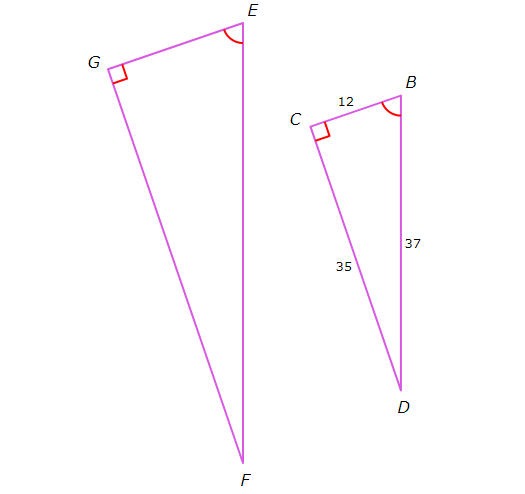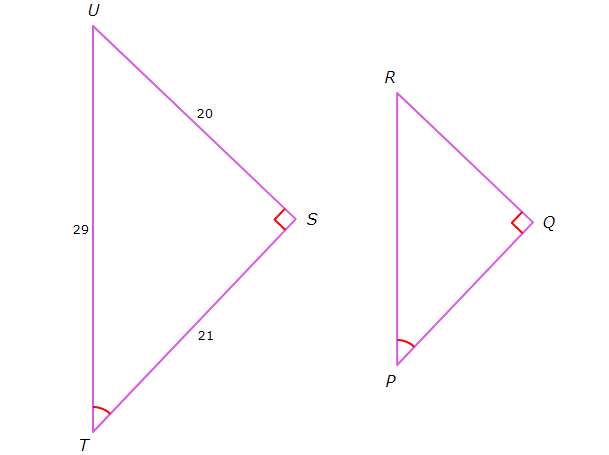TRIGONOMETRIC RATIOS IN SIMILAR RIGHT TRIANGLES
When we find the ratio of two sides in a triangle, the ratio of the corresponding sides in a similar triangle will always be the same.
As such, this means that the trigonometric ratios (sine, cosine and tangent) in similar right-angle triangles are always equal.
Example 1 :
Find the value of cscE.

Solution :
In order to find csc E first we have to find the length all sides of triangle GEF.
By observing the above two given triangles, we can prove that the given triangles are similar.
The AA Similarity Theorem states that two triangles are similar if two angles of one triangle are congruent to two angles of the other triangle.
In triangles GEF and BCD,
∠G = ∠C (90 degee)
∠E = ∠B
Therefore, by the AA Similarity Theorem,
△DEF ~ △GIH
So, ratios of corresponding side lengths will be equal.
Then,
EF/BD = GF/CD = GE/BC ----(1)
In triangle EFG,
cscE = Hypotenuse side/ Opposite side
cscE = EF/GF ----(2)
From (2),
EF/BD = GF/CD
EF/GF = BD/CD
EF/GF = 37/35
Substitute 37/35 for EF/GF in (2).
cscE = 37/35
Example 2 :
Find the vale of sec D.

Solution :
By observing the above two triangles, we can prove that the given triangles are similar.
The AA Similarity Theorem states that two triangles are similar, if two angles of one triangle are congruent to two angles of the other triangle.
In triangles GHI and DFE,
∠I = ∠E (90 degree)
∠G = ∠D
Therefore, by the AA Similarity theorem,
△GHI ~ △DFE
So, the ratios of corresponding side lengths will be equal.
Then,
GH/DF = IH/EF = GI/DE ----(1)
secD = Hypotenuse side/Adjacent side
secD = DF/DE ----(2)
From (1),
GH/DF = GI/DE
GH/GI = DF/DE
17/8 = DF/DE
Substitute 17/8 for DF/DE in (2).
secD = 17/8
Example 3 :
Find the value of tan P.

Solution :
By observing the above two given triangles, we can prove that the given triangles are similar.
The AA Similarity Theorem states that two triangles are similar, if two angles of one triangle are congruent to two angles of the other triangle.
In triangles UST and PRQ,
∠S = ∠Q (90 degree)
∠T = ∠P
Therefore, by the AA Similarity theorem,
△UST ~ △PRQ
So, the ratios of corresponding side lengths will be equal.
Then,
UT/RP = US/RQ = TS/PQ ----(1)
tanP = Opposite side/Adjacent side
tan P = RQ/PQ ----(2)
From (1),
US/RQ = TS/PQ
US/TS = RQ/PQ
20/21 = RQ/PQ
Substitute 20/21 for RQ/PQ in (2).
tanP = 20/21
Kindly mail your feedback to v4formath@gmail.com
We always appreciate your feedback.
©All rights reserved. onlinemath4all.com
Recent Articles
-
Trigonometry Quotient Identities
Apr 29, 24 08:51 AM
Trigonometry Quotient Identities -
Trigonometry Reciprocal Identities
Apr 28, 24 10:10 AM
Trigonometry Reciprocal Identities -
IB Diploma Mathematics Problems on Exponents
Apr 28, 24 05:42 AM
IB Diploma Mathematics - Problems on Exponents